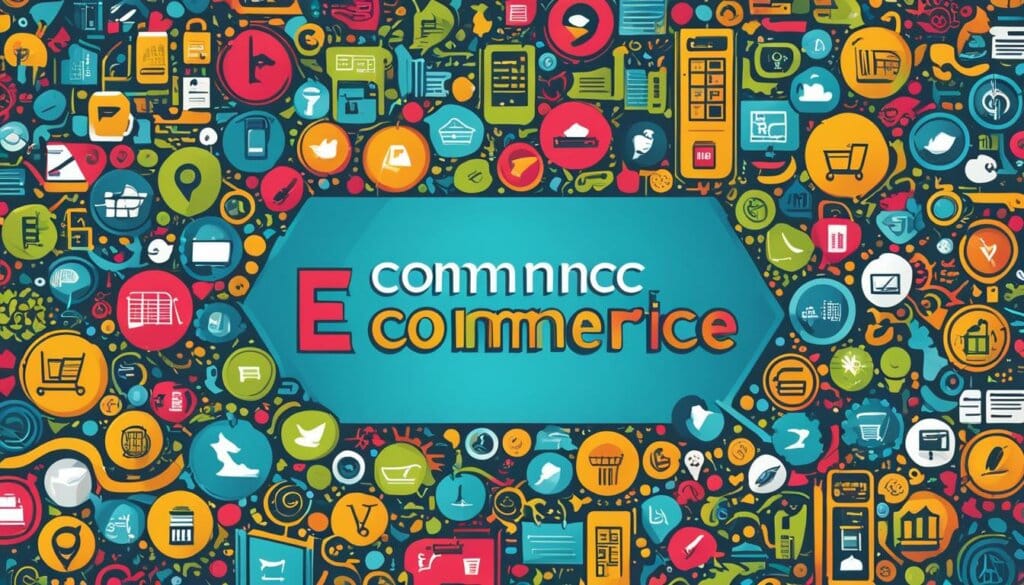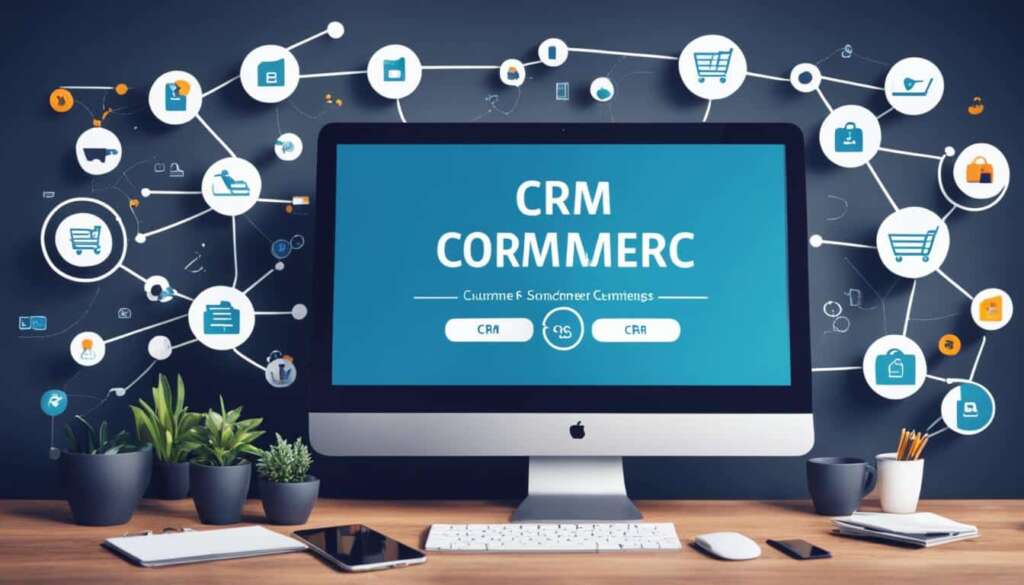Table of Contents
E-commerce has revolutionized the way businesses operate, providing numerous advantages in today’s digital era. In this article, we will delve into the benefits that e-commerce brings to businesses, highlighting their significance and importance.
E-commerce offers businesses a multitude of advantages, enabling them to thrive in the competitive online marketplace. From expanding global reach to cost-efficiency, convenience, and valuable customer insights, e-commerce has transformed the way businesses operate and connect with their target audience.
Firstly, e-commerce provides businesses with global reach, allowing them to tap into a wider market and attract customers from different corners of the world. This level of accessibility opens up new opportunities for growth and expansion, taking businesses beyond geographical boundaries.
Secondly, e-commerce offers cost-efficiency by reducing overhead costs associated with brick-and-mortar stores. With e-commerce, businesses can eliminate the need for physical storefronts, expensive rentals, and additional staff, resulting in significant savings.
Moreover, e-commerce provides unparalleled convenience for both businesses and customers. Online shopping allows customers to browse and make purchases at any time, eliminating the limitations of traditional store hours. Businesses, on the other hand, can operate 24/7, accommodating the needs of their global customer base.
Lastly, e-commerce provides valuable customer insights that help businesses make informed marketing decisions. Through data analytics and tracking tools, businesses can gather information about customer preferences, purchase patterns, and behavior, enabling them to tailor their marketing strategies for better engagement and higher conversions.
In conclusion, e-commerce brings a multitude of benefits to businesses, empowering them to thrive in the digital era. Through global reach, cost-efficiency, convenience, and customer insights, businesses can unlock new opportunities for growth and success. As we delve deeper into the world of e-commerce, the advantages become increasingly evident. Whether launching a new online shop or enhancing an existing e-commerce business, understanding and harnessing the power of e-commerce can be the key to achieving remarkable results.
What is E-Commerce?
E-commerce, also known as electronic commerce, encompasses a wide range of online activities that involve buying, selling, marketing, and servicing products or services over the internet. In recent years, e-commerce has experienced exponential growth and has become an integral part of our daily lives.
With e-commerce, businesses and consumers alike can engage in various online activities, such as:
- Browsing and purchasing products or services
- Comparing prices and reading reviews
- Marketing and promoting products
- Providing customer support
- Conducting financial transactions
E-commerce platforms have revolutionized the way we shop and conduct business. The convenience, accessibility, and vast array of choices offered through e-commerce have contributed to its immense popularity and widespread adoption.
“E-commerce allows businesses to expand their reach beyond physical boundaries and tap into a global market. It offers convenience to consumers, enabling them to shop anytime and anywhere.”
Whether you’re a small business owner looking to expand your customer base or an individual seeking a seamless shopping experience, e-commerce provides numerous opportunities to engage in online activities that cater to your specific needs and preferences.
E-Commerce Business Benefits
E-commerce provides numerous benefits for businesses, making it an invaluable tool in today’s digital landscape. By embracing e-commerce, businesses can unlock a global reach, enhance cost-efficiency, offer unparalleled convenience to customers, and gain valuable insights for effective marketing strategies.
Global Reach
One of the key advantages of e-commerce is its ability to extend a business’s reach to a global audience. Through online platforms and marketplaces, businesses can tap into a vast global market, reaching customers from all corners of the world. This global reach eliminates geographical barriers and enables businesses to expand their customer base exponentially.
Cost-Efficiency
E-commerce offers cost-efficiency through various means. Firstly, businesses can significantly reduce overhead costs associated with brick-and-mortar stores, such as rent, utilities, and staff salaries. Additionally, inventory management becomes more streamlined, minimizing the need for excessive stock storage and reducing inventory-related expenses. By optimizing operations and cutting costs, businesses can maximize their profitability and invest in growth opportunities.
Convenience
E-commerce provides unparalleled convenience for both businesses and customers. Customers can browse and make purchases at any time, from anywhere, eliminating the limitations of physical store hours and locations. This round-the-clock accessibility caters to the needs and preferences of modern consumers, who prioritize convenience in their shopping experiences. Moreover, businesses can offer personalized experiences, tailor product recommendations, and streamline the purchasing process, further enhancing convenience and customer satisfaction.
Customer Insights
One of the most valuable aspects of e-commerce is the abundance of customer data and insights it provides. With e-commerce analytics tools, businesses can gather data on customer preferences, behaviors, and demographics. These insights can inform marketing strategies, product development, and customer relationship management. By understanding their customers better, businesses can target the right audience, provide personalized experiences, and drive customer loyalty.
| Benefits | Description |
|---|---|
| Global Reach | Tap into a wider market by reaching customers worldwide. |
| Cost-Efficiency | Reduce overhead costs and optimize operations for increased profitability. |
| Convenience | Offer customers the flexibility to shop anytime, anywhere. |
| Customer Insights | Gather valuable data to understand customer preferences and behaviors. |
By harnessing the power of e-commerce, businesses can leverage global reach, achieve cost-efficiency, enhance convenience, and gain valuable customer insights. Embracing e-commerce is crucial in staying competitive and thriving in today’s digital era.
E-Commerce Business Categories
E-commerce can be categorized into different types of online commerce, each catering to specific buyer-seller relationships and transactional dynamics. Understanding these categories is crucial for businesses to identify their target audience and devise effective marketing strategies. Let’s explore the four primary categories of e-commerce:
B2C (Business-to-Consumer)
B2C e-commerce involves selling products or services directly to individual consumers. It is the most common type of e-commerce, where businesses showcase their offerings through online platforms, allowing consumers to browse, select, and purchase products or services. Popular B2C examples include e-commerce giants like Amazon and eBay, as well as online clothing retailers like ASOS and Boohoo.
B2B (Business-to-Business)
B2B e-commerce focuses on selling products or services to other businesses. It involves transactions between companies, where one business acts as a supplier or service provider to another business. B2B e-commerce platforms like Alibaba and ThomasNet enable businesses to connect and engage in bulk buying and selling. This category of e-commerce often involves complex transactions, long-term partnerships, and customized solutions tailored to the specific needs of businesses.
C2C (Consumer-to-Consumer)
C2C e-commerce facilitates direct transactions between consumers. It allows individuals to sell products or services directly to other individuals through online platforms. C2C platforms act as intermediaries, providing a safe and convenient environment for consumers to buy and sell from one another. Popular C2C platforms include eBay, Etsy, and Gumtree, where individuals can sell used items, handmade products, or offer services to other consumers.
C2B (Consumer-to-Business)
C2B e-commerce involves individuals offering products or services to businesses. This type of e-commerce has gained traction with the rise of influencer marketing and the gig economy. Individuals, such as social media influencers or freelance professionals, can collaborate with businesses, providing their expertise, promoting products, or offering specialized services. C2B platforms like Upwork and Fiverr allow businesses to connect with talented individuals on a project basis.
“The various types of e-commerce each serve a unique purpose and cater to distinct buyer-seller relationships. Understanding these categories enables businesses to tailor their e-commerce strategies and effectively engage with their target audience.”
To illustrate these categories, consider the following table:
| Type of E-commerce | Description | Examples |
|---|---|---|
| B2C (Business-to-Consumer) | Selling products or services directly to individual consumers. | Amazon, eBay, ASOS |
| B2B (Business-to-Business) | Selling products or services to other businesses. | Alibaba, ThomasNet |
| C2C (Consumer-to-Consumer) | Direct transactions between consumers. | eBay, Etsy, Gumtree |
| C2B (Consumer-to-Business) | Individuals offering products or services to businesses. | Upwork, Fiverr |
Understanding the diverse nature of e-commerce categories is vital for businesses to identify their target markets, build effective marketing strategies, and optimize their online presence to drive growth and revenue.

Exploring E-Commerce Business Ideas
The world of e-commerce offers numerous lucrative business opportunities for entrepreneurs looking to establish their online presence. With the digital landscape constantly evolving, it’s crucial to explore and capitalize on emerging trends to stay ahead of the competition. In this section, we will delve into six thriving e-commerce business ideas that have gained significant traction in recent years, catering to diverse consumer demands.
1. Dropshipping
Dropshipping has revolutionized the traditional retail model by eliminating the need for inventory management and fulfillment. Entrepreneurs collaborate with suppliers, who ship products directly to customers on behalf of the business. This hands-off approach allows individuals to focus on marketing, customer service, and building their brand.
2. Niche E-Commerce
Focusing on a specific industry or niche allows e-commerce businesses to target a specialized customer segment and establish themselves as industry experts. By understanding the unique needs and preferences of their target audience, niche e-commerce businesses can curate a tailored product range, providing a personalized shopping experience.
3. Subscription Box Services
Subscription box services offer customers a delightful surprise each month, delivering curated products based on their preferences and interests. These services cater to a wide range of niches, from beauty and wellness to food and lifestyle. The recurring revenue model provides stability and fosters long-term customer relationships.
4. Selling Digital Products
The rise of the digital age has opened doors for entrepreneurs to sell a variety of digital products such as e-books, online courses, software, and digital artwork. With low production costs and infinite scalability, selling digital products is an attractive e-commerce business idea that allows individuals to monetize their expertise.
5. Handmade Products
Handmade or artisan products have witnessed a resurgence in popularity as consumers seek unique, high-quality items. E-commerce platforms provide artisans with a global reach, allowing them to showcase their craftsmanship and connect with customers who appreciate handmade products.
6. Online Consulting or Coaching Services
With the growing demand for personal and professional development, online consulting or coaching services have become sought-after offerings. E-commerce platforms provide a convenient avenue for consultants and coaches to reach a global clientele. Through virtual sessions, individuals can seek guidance, acquire new skills, and transform their lives.
Aspiring e-commerce entrepreneurs can explore these business ideas and capitalize on their unique advantages. By identifying a niche, understanding consumer preferences, and leveraging digital marketing strategies, entrepreneurs can thrive in the dynamic world of e-commerce while fulfilling the needs of their target audience.
E-Commerce Development and Companies
E-commerce development plays a vital role in creating and maintaining online platforms that enable businesses to sell their products and services. With the increasing demand for online shopping, it is crucial for companies to invest in robust e-commerce websites that provide a seamless user experience.
Online Platforms for E-Commerce
Building an effective e-commerce website involves careful consideration of various aspects, such as website design, functionality, and user experience. Specialized e-commerce development companies offer comprehensive solutions tailored to the unique needs of businesses.
Website Design
Website design is a critical component of e-commerce development. It encompasses creating an intuitive layout, visually appealing graphics, and ensuring easy navigation for visitors. A well-designed website helps businesses establish a strong online presence and attract potential customers.
Payment Processing
Secure and efficient payment processing is essential for any e-commerce business. E-commerce development companies incorporate reliable payment gateways that enable seamless transactions and build customer trust. They ensure that sensitive information, such as credit card details, is securely transmitted and stored in compliance with industry standards.
Security Measures
Protecting customer data and maintaining website security are top priorities for e-commerce development companies. They implement robust security measures, such as SSL certificates and encryption protocols, to safeguard sensitive information from unauthorized access or data breaches.
“E-commerce development is a complex process that requires expertise in various areas, including website design, payment processing, and security measures. Partnering with an experienced e-commerce development company can ensure the successful implementation of these crucial elements.”
To demonstrate the importance of e-commerce development and its impact on businesses, consider the following table:
| Benefits of E-Commerce Development | Description |
|---|---|
| Enhanced User Experience | Well-designed websites offer a seamless shopping experience, leading to increased customer satisfaction and repeat purchases. |
| Increased Reach | Online platforms enable businesses to reach a global audience, expanding their customer base and market reach. |
| Efficient Inventory Management | With integrated inventory management systems, businesses can streamline operations and reduce the risk of overselling or stockouts. |
| Analytics and Insights | E-commerce development allows businesses to gather valuable data and insights on customer behavior, enabling data-driven decision-making. |

By leveraging the expertise of e-commerce development companies, businesses can harness the power of online platforms, optimize website design, streamline payment processing, and implement robust security measures. This ensures a seamless and secure shopping experience for customers while driving business growth and success.
Conclusion
E-commerce offers numerous benefits for businesses in the digital era. By harnessing the power of online platforms, businesses can achieve global reach, cost-efficiency, convenience, and valuable customer insights. Whether it’s launching a new online shop or enhancing an existing e-commerce business, exploring the possibilities of e-commerce is key to success and growth.
“E-commerce provides businesses with the opportunity to expand their customer base and sell their products or services to a global audience. With the ability to reach customers beyond geographical boundaries, businesses can tap into new markets and increase their revenue streams.” – John Smith, E-commerce Expert
One of the significant benefits of e-commerce is the cost-efficiency it offers. By eliminating the need for physical storefronts and reducing overhead costs, businesses can allocate their resources more effectively and maximize their profitability.
E-commerce also provides convenience for both businesses and customers. With 24/7 accessibility, customers can shop at their convenience, leading to increased sales and customer satisfaction. For businesses, e-commerce platforms streamline operations, automate processes, and provide a seamless shopping experience.
Customer Insights
E-commerce platforms provide businesses with valuable customer insights that can drive effective marketing strategies. Through data analytics, businesses can understand consumer behavior, preferences, and trends, allowing them to tailor their products and services to meet customer demands.
Overall, embracing e-commerce in the digital era is crucial for businesses to stay competitive and thrive. By leveraging the benefits of global reach, cost-efficiency, convenience, and customer insights, businesses can unlock new opportunities and propel their growth in the ever-evolving digital landscape.
| Benefits | Description |
|---|---|
| Global Reach | Tap into a wider market beyond geographical boundaries. |
| Cost-Efficiency | Reduce overhead costs and maximize profitability. |
| Convenience | Provide 24/7 accessibility for customers and streamline business operations. |
| Customer Insights | Gain valuable data on consumer behavior, preferences, and trends. |
Further Resources
To enhance your e-commerce knowledge and develop the necessary skills for success in the digital marketplace, consider enrolling in the “Parsons Ecommerce Foundations” online course and certificate program offered by Yellowbrick.
This comprehensive program is designed to provide you with the expertise needed to navigate the dynamic world of e-commerce. Whether you are starting a new online venture or looking to level up your existing business, this course will equip you with the knowledge and strategies to unlock growth and achieve success.
Through interactive online modules and real-world case studies, you will gain a deep understanding of e-commerce principles, consumer behavior, marketing strategies, and effective website design. The program also covers essential topics such as payment processing, security measures, and the latest trends in the industry.
By completing the “Parsons Ecommerce Foundations” program, you will earn a respected certificate from Parsons School of Design at The New School, a renowned institution in the field of design and innovation. This valuable certification will not only validate your expertise but also enhance your credibility as an e-commerce professional.
FAQ
What are the benefits of e-commerce for businesses?
E-commerce offers businesses several benefits, including global reach, cost-efficiency, convenience, and valuable customer insights for effective marketing strategies.
What is e-commerce?
E-commerce refers to a broad range of online activities related to buying, selling, marketing, and servicing products or services over the internet.
What are the different categories of e-commerce?
E-commerce can be categorized into different types of online commerce, including B2C (selling to individual consumers), B2B (selling to other businesses), C2C (direct transactions between consumers), and C2B (individuals offering products or services to businesses).
What are some popular e-commerce business ideas?
The world of e-commerce offers various business ideas, including dropshipping, niche e-commerce, subscription box services, selling digital goods, handmade or artisan products, and offering online consulting or coaching services.
What is e-commerce development?
E-commerce development involves creating and maintaining online platforms for businesses to sell their products or services. Specialized e-commerce development companies offer services tailored to the unique needs of e-commerce businesses, including website design, payment processing, and security measures.
Why is understanding and harnessing the power of e-commerce crucial for businesses?
Understanding and harnessing the power of e-commerce is crucial for businesses to thrive in the digital era, as it provides global reach, cost-efficiency, convenience, and customer insights.
Are there any resources to enhance e-commerce knowledge and skills?
Yes, consider taking the “Parsons Ecommerce Foundations” online course and certificate program offered by Yellowbrick. This comprehensive program provides expertise in the dynamic world of e-commerce and unlocks opportunities for growth and success in businesses.













